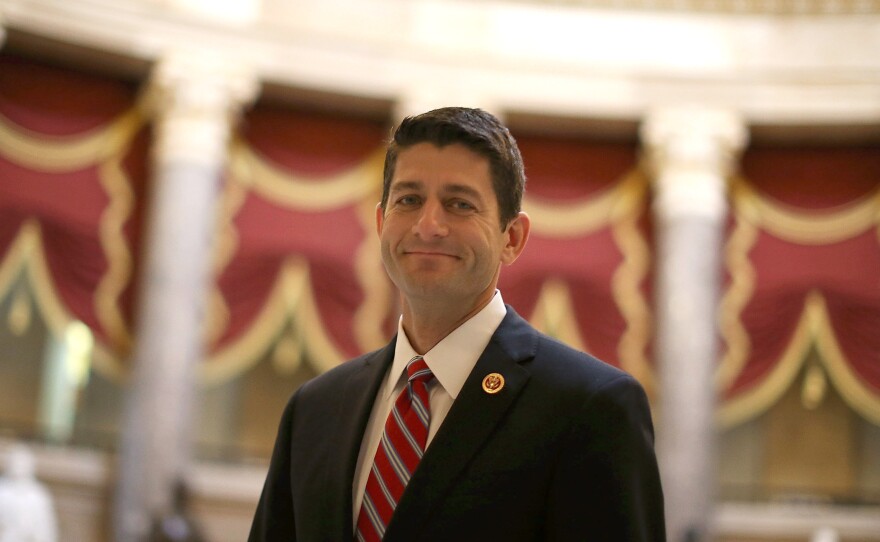
Are House Republicans still seeking Democratic concessions on the Affordable Care Act? Or have they switched their sights to even bigger targets: federal spending on entitlements like Medicare and Social Security?
The answer on Wednesday depended on which Republican you asked.
Paul Ryan's Pitch
Rep. Paul Ryan, R-Wis., last year's Republican vice presidential nominee and one of the party's big policy thinkers, tried to shift the debate to entitlements in a Wall Street Journalop-ed post. In the piece, Ryan didn't mention Obamacare once.
Arguing that Democrats and Republicans should negotiate to simultaneously end the government shutdown, raise the debt ceiling and make changes that would lower the trajectory of entitlement spending, Ryan, the House Budget Committee chairman, wrote:
"We need to open the federal government. We need to pay our bills today -- and make sure we can pay our bills tomorrow. So let's negotiate an agreement to make modest reforms to entitlement programs and the tax code."
Tea Party Balks
But Tea Party-affiliated Republicans couldn't get past Ryan's failure to mention Obamacare. Amanda Carpenter, a communications adviser to Sen. Ted Cruz, R-Texas, tweeted: "There is one big word missing from this op-ed. It's start(s) with an O and ends with BAMACARE ..." Hers wasn't an isolated opinion.
Hard-liners' concerns that House Republican leaders might be shifting the fight that led to the government shutdown -- which was in its ninth day -- might explain why Speaker John Boehner, R-Ohio, took to the House floor Wednesday:
"Our message in the House has been pretty clear. We want to reopen our government and provide fairness to all Americans under the president's health care law. You know, the law had a big rollout last week, but it's been called, and I'll quote: 'an inexcusable mess,' 'a rolling calamity' ... What a train wreck. How can we tax people for not buying something from a website that doesn't work? How can you give big businesses a tax break and leave hard-working families out in the cold? This is why we need to sit down and have a conversation about the big challenges that face our country."
One way of interpreting the seemingly differing messages from Boehner and Ryan was that it reflected the continued House Republican search for an exit strategy from the current fiscal nightmare. It also seemed to reflect the persistent pressure on Boehner to hew to the hard-liners' preferred strategy.
Military Death Benefits Draw Focus
Both Congress and the White House moved to address one result of the government shutdown that has outraged virtually everyone: It has halted the payment of $100,000 death benefits to the survivors of military service members killed in Afghanistan.
The House passed a bill Wednesday to get the payments to the dead troops' families. On the other end of Pennsylvania Avenue, the White House announced that it will allow a charity to pick up the cost of the payments during the shutdown, the Associated Press reported.
Meetings
Obama met with House Democrats on Wednesday at the White House, and in a separate meeting of House leaders hosted Boehner; Majority Leader Eric Cantor, R-Va.; Minority Leader Nancy Pelosi, D-Calif.; and Minority Whip Steny Hoyer, D-Md. In a statement, Pelosi reported no real progress from the meeting.
And More Meetings
In an interesting twist, House Republicans responded to Obama's invitation to meet with all 232 of them at the White House on Thursday by saying that they would instead send a negotiating party of House GOP leadership and committee chairs.
"President Obama is disappointed that Speaker Boehner is preventing his members from coming to the White House," Carney said in a statement. "The President thought it was important to talk directly with the members who forced this economic crisis on the country about how the shutdown and a failure to pay the country's bills could devastate the economy."
Poll: GOP Hits New Lows
A Gallup poll found just 28 percent of Americans with a favorable view of the Republican Party. Not only was that a 10-percentage point drop from last month, it was the lowest favorability rating Gallup has recorded for either major party since the pollster began asking the question in 1992. A record-high 62 percent of respondents said they viewed the Republican Party unfavorably.
The last time the GOP's favorability rating came close to this level was in 1999, around the time Republicans impeached President Bill Clinton. At that point, Gallup found that only 31 percent of Americans viewed the party favorably.
But Democrats didn't come out of Gallup's most recent poll untarnished either. Forty-three percent of those surveyed viewed the Democratic Party favorably, down 4 points from September, while 49 percent viewed it unfavorably.
The survey was conducted from Oct. 3-6, shortly after the federal government partially shut down for the first time since 1996.
The results also come after a series of polls released earlier in the week showed Americans placing much of the blame for the shutdown on congressional Republicans.
(Adam Wollner contributed to this post.)
Copyright 2013 NPR. To see more, visit www.npr.org.






